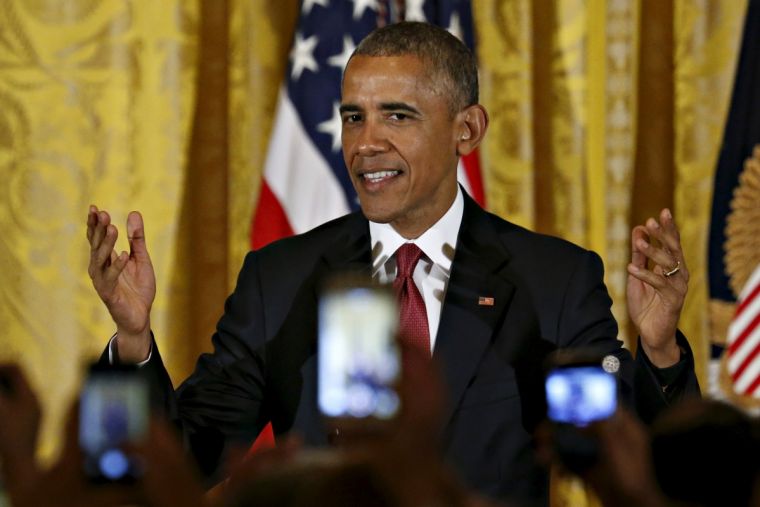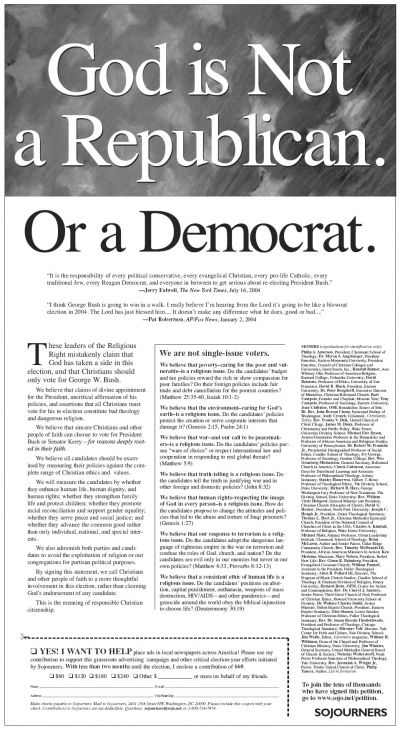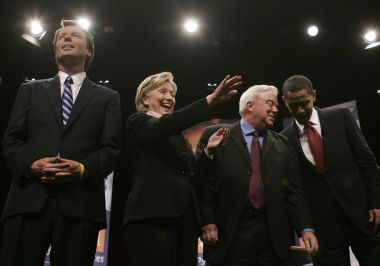Who are the Christian Left in America?

As Republican presidential candidates go out of their way to talk about their faith and attend Christian events in order to appeal to the Christian right, there is a lingering question: what about the Christian left?
During the 2004 presidential campaign, Sojourners launched the famous "God is not a Republican, or a Democrat" campaign. It would appear the debate about God's allegiance is ongoing.

Evangelist Jerry Falwell and the co-founders of the 'Moral Majority' are credited with the birth of the Christian right in 1979 – an idea that has proved incredibly powerful and long-lasting. Voting patterns among evangelical Protestants in the last three presidential elections have shown steady majority support of around 75 per cent for the Republican Party.
The reality is that almost none of the presidential candidates would claim to be an atheist – perhaps with the exception of Bernie Sanders. But the Christian right are generally looking for something in particular – someone who is conservative on social issues such as abortion and same-sex marriage, among other things.
Despite the fact that President Obama identifies as a Christian and speaks about Christ as his saviour, claims that he is a Muslim have become so commonplace that the president has even joked about them publicly – quipping at this year's Correspondent's Dinner that he prays "five times a day" in accordance with Islam.
This weekend, prospective Republican candidate Jeb Bush once again pitted the political agenda of the left against religious freedom in his commencement address at Liberty University. "The progressive political agenda is ready for its next great leap forward, and religious people or churches are getting in the way. Our friends on the left like to view themselves as the agents of change and reform, and you and I are supposed to just get with the program," he said.
But even though three quarters of evangelicals may vote Republican, that still leaves about a quarter who vote Democrat. And if we broaden the field, black Protestants and those of other denominations have overwhelmingly voted for the Democrat presidential candidate in the last four elections – ranging from 86 per cent to 95 per cent support. Catholics are more evenly split between the two parties, though it has been widely noted that Obama gained considerable support among Hispanic Catholics (around 75 per cent in both elections).
There is also a notable trend toward progressive views among younger Christians. According to research by the Public Religion Research Institute (PRRI) released in 2012, only 17 per cent of those aged 18-33 are religious conservatives, compared to 47 per cent of 66-88-year-olds. And there has been a roughly even increase in those with moderate, progressive, and non-religious views. Among millennials, 23 per cent are religious progressives, compared to 12 per cent of the 'silent generation'.
Among Christians, the progressive agenda often particularly focuses on social justice issues. Common topics include concern for the environment, support for the minimum wage, calling for increased gun control and an end to capital punishment. For some Christians there is also a desire to demonstrate support for the LGBT community – both in the Church and in society.
Key voices on the left
So where are these views given voice? Websites such as The Christian Left, who describe themselves as "Christians who think the political and Christian right-wing have got their priorities wrong" or Christian Democrats of America set themselves up in clear opposition to the Christian right.
Faith in Public Life is one organisation trying to advance the role of faith in society, but was set up to be a "positive alternative" to the religious right. They are involved with the 'Nuns on the Bus' group, set up by Catholic social justice lobby group NETWORK. The 'Nuns on the Bus' have campaigned on number of issues, including seeking to rally the faith community on immigration reform in 2013.
Sojourners, founded by Jim Wallis, has a broad religious base including evangelicals, Catholics, Pentecostals and Protestants, of both the conservative and progressive persuasion, united around social justice. They say their emphasis is on the teachings of Jesus, which is seen as caring for the poor.

Similarly, Red Letter Christians, the movement (and website) founded by Tony Campolo also places primary concern on the words and life of Jesus. Fellow Red Letter Christian Shane Claiborne has gained respect by living out the views he has written in books such as Jesus for President and The Irresistible Revolution in his lifestyle – founding The Simple Way, a faith community in Philadelphia. But though they don't claim that the Democrats have it all right, they certainly don't shy away from getting political; Campolo, who was Bill Clinton's spiritual advisor, also endorsed Hilary Clinton's bid for the presidency last month.
The Patheos Progressive Christian Channel hosts numerous blogs by prominent Christians, including Fred Clark's 'Slacktivist' blog, Nadia Bolz-Weber, the pastor of All Sinners and Saints church in Denver, and Frank Schaeffer, son of Francis, who Frank has described as the "intellectual architect" of the religious right.
Then there are single-issue campaigns, such as the 'Not All Like That' (NALT) Christians Project, for Christians who support LGBT equality and want to try and change the image of Christianity in America.
Or the Religious Coalition for Reproductive Choice, with the strapline "Pro-faith. Pro-family. Pro-choice". Dr Willie Parker is on the board of the RCRC and has become a prominent pro-choice Christian within the medical profession, even seeing it as his a form of 'ministry' to provide abortions.
Not all progressives are progressive
However, it doesn't necessarily follow that those who want to see a greater emphasis on social justice will automatically align themselves with the views of the Democratic Party. Nor does it mean that all 'progressives' are progressive on social issues.
The American Values Atlas (compiled by the PRRI) shows that while younger Americans may disagree with their parents' generation over things such as same-sex marriage (almost half of young white evangelicals support it), they are often surprisingly conservative in their views on abortion, with roughly two thirds of evangelicals of all ages saying they think it should be illegal in all or most cases.
This kind of picking and choosing between policies was also identified by Pew Research's study on political typology last year, which identified a category described as 'faith and family left'. This group represent a diverse racial group with strong religious convictions, who support government aid for the poor, but oppose same sex marriage.
What both the data and these various communities demonstrate is that there are a number of people calling for a more nuanced relationship between faith and politics in America, and one that reflects the range of opinion among Christians. But despite discussion of the 'rise of the Christian left', it may not be deemed to have fully 'risen' until the distinction is not based on a polarised depiction of one against the other.











